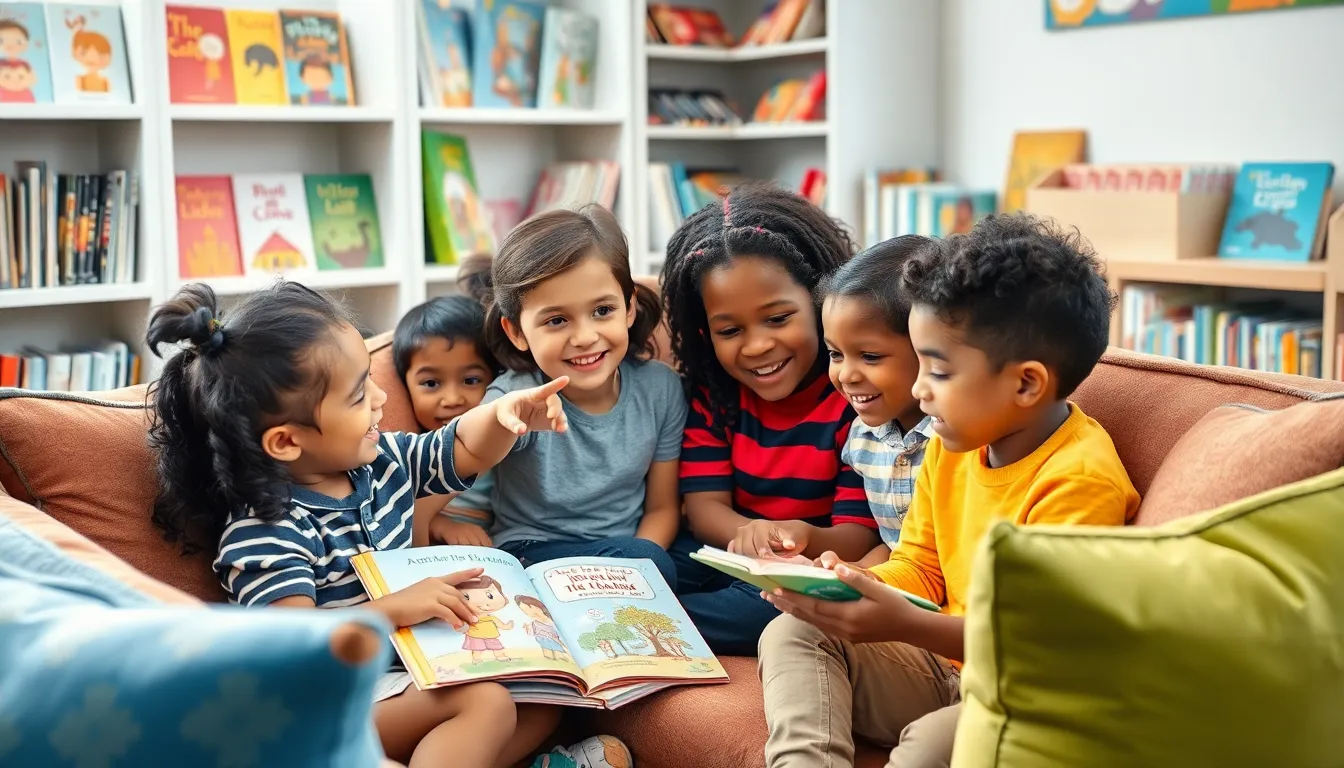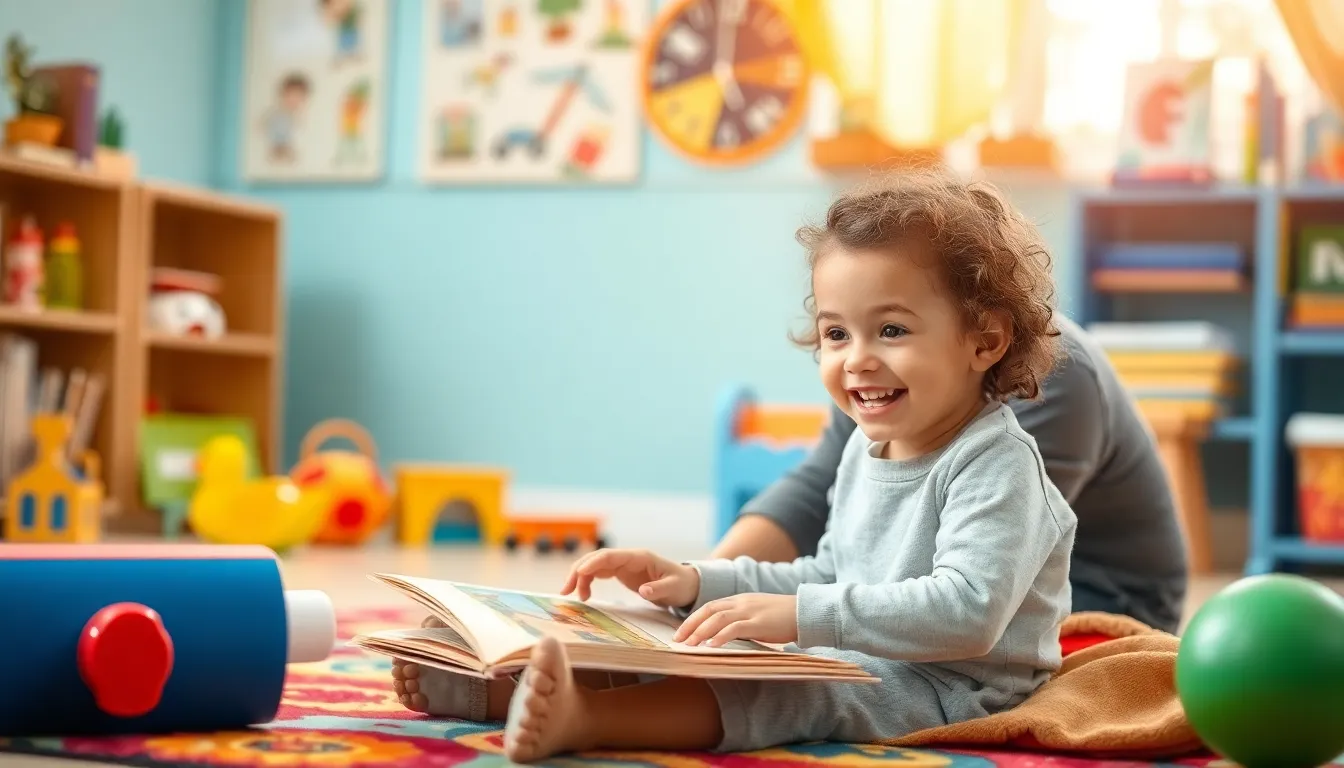Table of Contents
ToggleLanguage enrichment activities play a crucial role in enhancing communication skills and fostering a love for language. These engaging experiences not only support vocabulary development but also encourage creativity and critical thinking. Whether through interactive storytelling, playful word games, or immersive discussions, these activities create a vibrant environment for learners of all ages.
In an increasingly interconnected world, strong language skills are essential. They empower individuals to express themselves clearly and connect with others effectively. By incorporating language enrichment activities into daily routines, parents, educators, and caregivers can cultivate a rich linguistic landscape that nurtures lifelong learning. Embracing these activities can transform the way individuals interact with language, making it a fun and rewarding journey.
Understanding Language Enrichment Activities
Language enrichment activities refer to interactive experiences designed to enhance linguistic skills and foster a passion for language. These activities play a crucial role in vocabulary expansion and effective communication.
Definition and Importance
Language enrichment activities encompass various playful and educational methods aimed at increasing language proficiency. These activities, including storytelling, word games, and role-playing, provide opportunities for immersion in language. They are important because they support cognitive development, enhance literacy skills, and promote social interaction. Engaging in these activities helps individuals express thoughts clearly, engage in critical thinking, and appreciate diverse forms of communication.
Goals of Language Enrichment
- Vocabulary Expansion: Activities aim to introduce new words through context and usage, facilitating deeper understanding.
- Comprehension Skills: Enrichment activities enhance listening and reading comprehension, enabling individuals to grasp ideas and concepts more effectively.
- Communication Skills: These activities encourage expressing thoughts clearly, enhancing articulation and active listening.
- Creativity and Imagination: Engaging in storytelling and creative writing fosters original thought and imaginative expression.
- Critical Thinking: Many enrichment activities promote problem-solving and analytical skills, essential for language processing and usage.
- Cultural Awareness: Language enrichment activities often incorporate diverse narratives and contexts, broadening understanding and appreciation of various cultures.
Types of Language Enrichment Activities

Various activities enhance language skills, engaging individuals in meaningful ways. These activities include interactive reading, creative storytelling, and language games.
Interactive Reading
Interactive reading involves sharing books in an engaging manner. This activity promotes discussion, questioning, and predicting outcomes. Parents or educators can ask open-ended questions to stimulate critical thinking. For example, asking, “What do you think will happen next?” encourages children to make predictions. Additionally, pointing out new vocabulary enhances word recognition, expanding their language base. Utilizing props or visual aids makes the experience even more engaging.
Creative Storytelling
Creative storytelling allows for the expression of imagination and creativity. This practice can occur through oral storytelling or writing exercises. Individuals can create their own stories based on prompts or illustrations. Encouraging characters’ development and setting descriptions stimulates vocabulary growth. For instance, crafting stories that incorporate new words challenges individuals while making learning enjoyable. This activity also fosters listening skills as participants share and listen to each other’s narratives.
Language Games
Language games provide a fun and interactive method for language learning. These games can range from word puzzles to board games that involve vocabulary usage. For example, Scrabble or Boggle challenges participants to create words from given letters. Incorporating rhyme or alliteration games helps improve phonetic awareness. Utilizing online platforms for language games expands access and creates opportunities for collaborative learning. Engaging in such games can significantly boost language fluency while maintaining an element of fun.
Benefits of Language Enrichment Activities
Language enrichment activities provide numerous benefits, enhancing cognitive abilities and nurturing social skills. Engaging in these activities fosters essential skills needed for effective communication.
Cognitive Development
Cognitive development occurs through language enrichment as these activities stimulate critical thinking and problem-solving skills. Engaging with language enhances memory retention and comprehension. Activities like storytelling and word games require individuals to process information and make connections, further developing their analytical abilities. For instance, interactive storytelling promotes creativity and encourages children to think critically about narratives. Expanding vocabulary through varied activities also supports cognitive flexibility, enabling individuals to understand and use language in diverse contexts.
Social Skills Enhancement
Social skills enhancement plays a vital role in language enrichment. Engaging in group activities fosters collaboration and teamwork. Participating in discussions and games helps individuals learn how to take turns, listen actively, and express themselves clearly. These interactions encourage empathy and understanding of others’ perspectives. Language enrichment activities, such as role-playing, allow individuals to practice social scenarios, improving conversational skills and building confidence in communication.
Implementing Language Enrichment Activities at Home
Implementing language enrichment activities at home fosters a rich linguistic environment. These activities can easily integrate into daily routines, making language learning enjoyable and effective.
Tips for Parents
- Read Aloud Regularly: Reading aloud engages children and enhances vocabulary. Choose a variety of genres and ask open-ended questions about the story to encourage discussion.
- Encourage Storytelling: Prompt children to create their own stories. This activity nurtures imagination, vocabulary, and narrative skills.
- Play Word Games: Introduce games like Scrabble, Boggle, or word searches. These games increase vocabulary and reinforce language skills in a fun way.
- Incorporate Everyday Conversations: Use daily activities as opportunities for dialogue. Discussing tasks like cooking or shopping helps expand vocabulary through context.
- Use Technology Wisely: Leverage educational apps and audiobooks. Interactive platforms can make language learning more dynamic, appealing to different learning styles.
Creating a Language-rich Environment
- Surround with Words: Label objects around the house in both English and other languages. Visual cues reinforce language recognition and vocabulary.
- Set Up a Reading Corner: Create a cozy space filled with books. Regular access to diverse literature encourages independent reading and exploration.
- Establish Routine Conversations: Designate specific times for discussion. Regular family meals or evening talks promote open dialogue and strengthen communication skills.
- Encourage Peer Interaction: Organize playdates or group activities focused on language-rich games. Engaging with peers builds social skills and encourages cooperative communication.
- Celebrate Language Diversity: Introduce stories from different cultures. This practice fosters appreciation for diverse narratives and enhances cultural awareness.
Language enrichment activities are vital for developing strong communication skills and a genuine love for language. By engaging in these interactive experiences, individuals can expand their vocabulary and enhance their critical thinking abilities. The benefits extend beyond language itself, fostering social skills and cognitive growth.
Implementing these activities at home or in educational settings creates a vibrant linguistic environment. This not only makes learning enjoyable but also encourages lifelong engagement with language. As parents and educators embrace these enriching practices, they contribute significantly to the linguistic and cognitive development of individuals, setting the stage for effective communication in an increasingly interconnected world.







